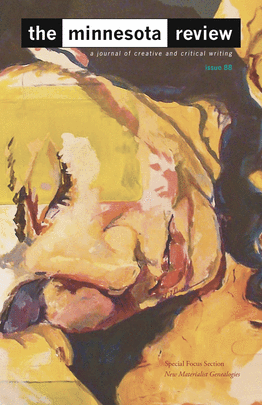the minnesota review: New Materialist Genealogies
Volume 2017, Number 88, 2017
Access to journal here.
Note 'NM Special Focus' is located in middle section.
Extract from introduction below:

Vera Bühlmann, Felicity Colman, and Iris van der Tuin
Introduction to New Materialist Genealogies
New Materialisms, Novel Mentalities, Quantum Literacy
Like the new materialist turn, feminist new materialist scholarship (Haraway 1988; Barad 2007) draws attention to a novel understanding of literacy that incorporates code and is not limited to linguistic registers of grammar, syntax, and semantics (Haraway 1997). At stake is the conception of literacy, whose articulations are capable of organizing the generative potential/contingency of the expressions and forms of conceptions as real things.
From the materialist investigations that coalesced through and in the merger of the sciences with humanities research (notably in Bergson 2004; Haraway 1988, 1991, 1997; Barad 2007; Lévy-Leblond 1976, 1999; Plotnitsky 2006, 2009), new materialist investigations join as part of a paradigmatic shift that we witnessed occurring across the pedagogic landscape of the early twenty-first century in environmental humanities, science, and technology studies as well as across the humanities and in the sciences (see Dolphijn and van der Tuin 2012). In the humanities, some of these shifts are articulated under the concepts explored in postcapitalist, posthumanist, and postcolonial positions. In the sciences, these new fields that opened in the twentieth century manifest, transversally rather than disciplinarily, the roles that informatics, systems theory, and cybernetics have de facto come to play in all fields (Wiener 1948; Bateson 1972; Whitehead 2011; Margulis and Sagan 2008; Hayles 2012). These investigations all result in a change in the narratives concerning knowledge forms, their production, and their meaning (Floridi 2015; Lyotard [1979] 1984; Serres 1969–80; Terranova 2004).
Through our study of new materialist research, what we have come to discern is that this new materialist literacy has in part come about as part of a consideration of the methods that feature in the twentieth century in “quantum-thinking.” The epistemological as well as the ontological status of these methods in their practice—that is, in their current actualization—have largely unsettled the pedagogical landscape as a whole, and they are profoundly disturbing from the
point of view of both objectivist and subjectivist philosophy. In effect, there are numerous attempts at disentangling—often in orthodox fashion—the disturbing co-incidence of information and energy, of code and matter, that we witness in electro-technics and informatics.
Continue reading here
COST Action IS1307 New Materialism: Networking European Scholarship on 'How Matter Comes to Matter'.
Here you will find background material, current activities, calls for papers, working group information, and project outputs.
With the changing of societies on local, national and international scales owing to economic, ecological, political and technological developments and crises, a reorganized academic landscape can be observed to be emerging. Scholarship strives to become increasingly interdisciplinary in order to grasp and examine the unfolding complexity of ongoing ecological, socio-cultural and politico-economic changes. Additionally, academics forge... Read more or find out Who's Who
- Call for Papers - Technology Matters and Matters of Technology: Exploring Theories of "Materiality" for Technology Research - June 25, 2018
- The return of materialism(s)? Matter between science, theory and art - University of Iceland
- Call for Entries - New Materialism Almanac 2018
- Urban Matters: Material Engagements with Communities and Borders in Times of Movement
Information relating to activities undertaken, including conferences, training schools, short-term scientific missions, and annual meetings, are archived here.
Filter activities by:
Conference7
Other7
STSM7
Training School7
- 7th Annual Conference: Performing Situated Knowledges: Space, Time, Vulnerability
- From Cosmos to Genes: New Materialist Methodologies Crossing the Humanities, Natural, and Technosciences
- MC Meetings: Barcelona, Maribor and Warsaw
- Training School 2: Research Genealogies and Material Practices
Working Groups focus on four key areas of research
Working Group One
Genealogies of New Materialisms; examines and intervenes in canonization processes by compiling a web-based bibliography, coordinating the OST 068/13 8 EN... Read more
Working Group Two
New Materialisms on the Crossroads of the Natural and Human Sciences; seeks to develop new materialisms at the boundaries of the human and natural sciences. The group focuses on how European new materialisms can rework the ‘Two Cultures' gap... Read more
Working Group Three
New Materialisms Embracing the Creative Arts; brings together European researchers, artists, museum professionals, and other activists with a keen interest in the material... Read more
Working Group Four
New Materialisms Tackling Economical and Identity – Political Crises and Organizational Experiments... Read more
2016–18
The Almanac comprises contributions from members of working groups, and participants in related activities, delineating key terms, more esoteric neologisms, and short provocations. Read more
New Materialism —
Networking European Scholarship on 'How matter comes to matter’

Website by Second Cousins

